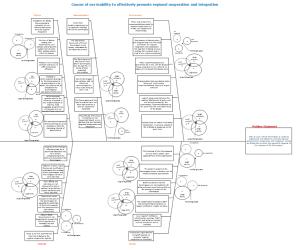Guest blog written by Abiodun Samson Oladipo, Adeola Busola Olayinka, Camilla Esther Araoye, Ibikunle Peter Olalekan, Emmanuel Oluwatosin Oke, Titi Oyeola.
This is a team of development practitioners who work for the Development Agenda for Western Nigeria (DAWN) Commission in Nigeria. They successfully completed the 15-week Practice of PDIA online course that ended in May 2019. This is their story.

Journeying through the Problem Driven Iterative Adaptation (PDIA) course could be likened to an adapted 1804 challenge, we simply sailed out with great expectations of learning new concepts within the development space. We knew the course was going to be educative but we never knew what would evolve. Today, we can categorically say the 15 weeks journey was worth it;
‘the course content; the critical thinking; the debates full of diverse insights; the guides, the weekly deadlines clashing with job demands, and all the fun derived interacting on each modules will be greatly missed.’
PDIA has given us a story to tell in our career progress, the story of six people in six different disciplines and expertise with two members in different locations, but working together to solve a problem – an amazing team building tool the PDIA process is, amalgamating a pool of ideas to solve a complex problem. Agreeing on a problem to work on wasn’t difficult, the team members had concerns about why our organisation wasn’t achieving its stated mandates beyond cultural affinities binding the Southwest region of Nigeria. Our organisation was established by the six States governments of the region to enact a development paradigm that would accelerate socioeconomic development across the States in the geopolitical region, thus, we were regarded as the development think tank of the region. However, a problem lingered! For over 5 years, the six states governments were not adopting the policy/program recommendations coming from their think tank. Based on this, we set out on the PDIA journey with the expectation that the process would help us to change the status quo.
Though with a pre-identified problem statement, one outstanding insight from the PDIA process was the need to reconstruct the problem in a manner that wasn’t biased towards a pre-conceived solution, and deconstruct to identify root-causes. This process reformed our thought process, we started seeing the intrinsic issues with solution entry points easier than the problem statement itself. This understanding of multiple entry points for resolving the root-causes and the process of iteration opened our minds to actions required to solve the problems; we spent about eight weeks interrogating/learning more about our problem. Thus, we developed a flexible mindset to the problem and became more convinced we are on the right path of finding the appropriate route to our solution, this energized our spirits to push through:
One appealing thing about the PDIA approach is that it gives room for trial and error in one’s context, it permits iteration and learning as many times as possible towards addressing policy and technical challenges.

PDIA gave us a different perspective to solving wicked-hard problems and developing organisational capability. Instead of our usual method of developing Workplans using log-frames, the course revealed an efficient method of achieving result by crawling, while also building capacity simultaneously. The course also highlighted the shortcomings of institutional transplantation, isomorphic mimicry and premature load bearing which we also identified in our case; an excessive fixation on international practices that is promoted by external consultants instead of institutionalising a process that will find a fitting solution to a problem and develop capacity of the task team in the process. It also brings to fore the fact that one individual cannot be responsible for a change; change and reforms happen through multi-agents efforts. Hence, the need to build effective teams of interested individuals, this we did and began working the process to acquire necessary abilities, authorities and acceptance on the change we seek. Beyond this, the course guided us to map stakeholders that are crucial to problems at hand, particularly those that will authorise our activities. This and the ‘Triple A’ Analysis was really useful for our first iteration.
We now have a strategic approach that prescribes the evolution of suitable locally-fitting solutions to problems, as against transplanting a solution that worked elsewhere for the same/similar problem. With this insights and tools, we will become PDIA ambassadors, we will share learnings with other staff in our organisation to ensure inclusive orientation of the organisation. The PDIA toolkit will also be used to build the capacity of junior colleagues by fully involving them while working on complex problems going forward. In this light, activities have begun in terms of garnering and synthesizing information needed to present a case to the management. In essence, the 15 weeks course made us realise that capacity comes from doing and developed capacity can be scaled up by sharing learning with colleagues within and even outside the organisation.

Though we are ending the weekly classes, we are not terminating the process, we’ll continue iterating until we arrive at a fitting and sustainable solution to our problem, we will work to improve our relationship with stakeholders and authorisers. We are grateful for this opportunity to learn.
To learn more, visit our website or download the PDIAtoolkit (available in English and Spanish) or listen to our podcast.